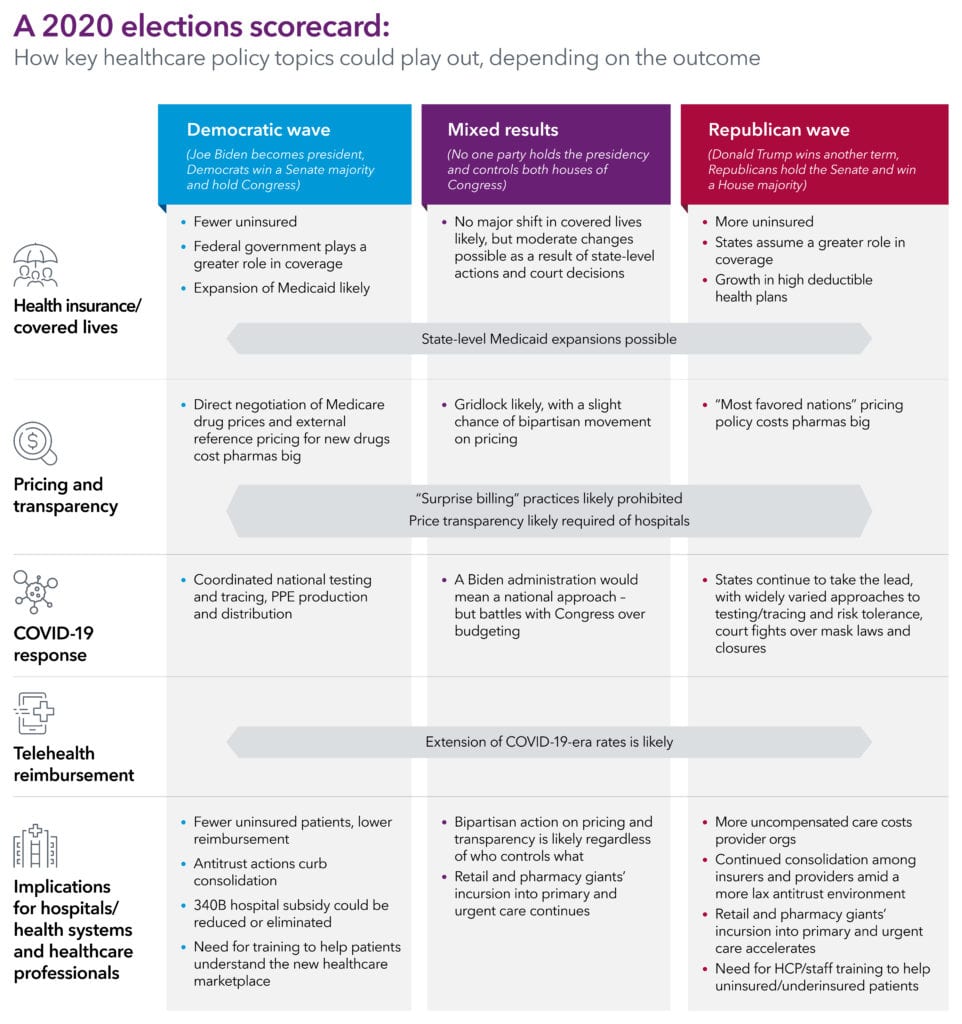Insights provided in this article were developed using data on and analysis of the impact of U.S. policy on healthcare and the pharmaceutical industry by analysts at DRG, part of Clarivate. DRG U.S. Managed Markets Insights provides robust qualitative insights on national, state and MSA level market access dynamics.
Ten years after the passage of the Affordable Care Act, the United States’ healthcare system is again at a political crossroads. November’s elections will have substantial implications for the provision of and payment for healthcare products and services. Here are six questions our healthcare policy experts are analyzing as America votes:
Health insurance and covered lives
Does the Affordable Care Act expand, shrink, or disappear altogether?
- If the Democrats win it all:
- Biden’s healthcare platform calls for building on the Affordable Care Act framework with the addition of a “Medicare-like” public health insurance option, along with lowering the age of enrollment for Medicare to 60 and restoring the ACA’s “individual mandate,” which requires uninsured individuals to purchase coverage. A Democratic Senate majority might make this possible.
- Biden’s plan would also seek to patch gaps in Medicaid by extending its public option to cover otherwise eligible citizens in the 12 remaining states that have chosen not to expand coverage (the Supreme Court ruled in 2012 that the federal government could not mandate that states expand coverage, thereby blunting a key mechanism by which the law was to ensure near-universal insurance of citizens). It would also allow undocumented immigrants to buy into the public option (albeit unsubsidized) and aims to cap insurance premiums.
- A Biden administration would move swiftly to shore up the ACA by undoing Trump’s executive actions
- allowing short-term insurance plans with lower premiums but looser benefits protections, and
- depleting marketing budgets for ACA exchange plan enrollments.
- Any actions by Biden would likely face legal challenges, much as the ACA has.
- If the Republicans win it all:
- With continued Republican domination of Congress, a second Trump term would see a continued attack on the ACA from both the White House and the courts.
- Should conservatives succeed in striking down the law, it could mean the end not just of the ACA’s exchange plans but also of the Medicaid expansions that have added more than 12 million lives to insured rolls across 38 states and Washington, D.C.
- These changes would precipitate a rise in the number of uninsured Americans and a shift toward direct payment for medical products and services among the uninsured, perhaps offset by health reimbursement arrangements and the less-comprehensive short-term limited duration insurance plans and association health plans favored by the Trump administration.
- If power is divided:
- Divided rule would mean a reversion to the status quo ante, though conservative efforts to overturn the ACA would shift to the newly Trump-appointee-filled Federal courts, starting with November’s California v. Texas hearings at the United States Supreme Court, in which the state of Texas is asking the court to invalidate the ACA root and branch.
- Should the ACA survive, however, we could see continued expansion of Medicaid coverage at the state level through state legislative actions and ballot initiatives. Voters in the Republican bastion of Missouri passed a ballot initiative in August, expanding coverage to 217,000 low-income residents and making Missouri the sixth state to expand Medicaid since Trump took office, despite the opposition of national Republicans to Medicaid expansion. Voters in Idaho, Nebraska, and Utah bypassed Republican-controlled legislatures in the 2018 midterm elections to pass ballot initiatives expanding Medicaid, joining Maine, where voters passed a ballot initiative in 2017.
- Faced with a Republican Senate, or a Democratic Senate unwilling to toss out the filibuster, a Biden administration could push for more incremental expansions of coverage, such as lowering the age of Medicare eligibility to 60 – a step toward greater federal control, but one that might be more palatable to centrist Senators and voters with commercial coverage.
- The wild card: An open Supreme Court seat and a major case on the ACA
- November’s California v. Texas case couldn’t be higher-stakes, and even before the untimely passing of Justice Ruth Bader Ginsburg, it was thought to be a judicial question mark. If Senate Republicans succeed in confirming and seating Amy Coney Barrett, an avowed skeptic of the ACA’s legality, it would make an invalidation of the law more likely, and that would prompt a sharp rise in the rate of uninsured Americans.
Pricing and transparency
Will Washington crack down on drug prices?
- If the Democrats win it all:
- Biden’s healthcare platform includes a vow to “stand up to abuse of power by prescription drug corporations” by:
- Repealing the law barring Medicare from negotiating drug prices with pharma
- Prohibiting pharma from increasing the Medicare prices of their products more than the general inflation rate and imposing a tax penalty on manufacturers that cross that line
- Establishing an independent review board to assess the value of launch products and recommend a price for Medicare based on external reference pricing
- Biden’s plan also calls for allowing U.S. consumers to import Rx drugs from other countries, and to strike pharma’s advertising tax exemption in order to make DTC advertising prohibitively expensive
- Biden’s healthcare platform includes a vow to “stand up to abuse of power by prescription drug corporations” by:
- If the Republicans win it all:
- In September, the Trump administration issued an election-eve executive order that would peg the prices Medicare pays for Rx drugs (both office-administered and pharmacy-dispensed) to those paid by other countries – a so-called “most favored nations” policy. With the industry pledging a court fight, it’s unlikely to be implemented before the end of Trump’s first term, though if granted another four years, Trump could make it stick – at a steep cost to pharma.
- If power is divided:
- Given the polarized and unified nature of the parties, and the power of industry lobbies, little movement is likely on this front, but don’t count it out – lowering drug prices has broad bipartisan appeal among Democratic and Republican constituents.
Pricing and transparency
Will Washington ban surprise billing and mandate hospital price transparency?
- If the Democrats win it all:
- Biden’s plan includes an end to surprise billing practices for out-of-network patients.
- If the Republicans win it all:
- In September, Trump signed an executive order directing his Secretary of Health and Human Services to work with Congress to pass legislation addressing surprise billing by Jan. 1, 2021.
- If power is divided:
- A need for action to prevent surprise billing is one of the rare areas on which there seems to be some degree of bipartisan consensus, and a bipartisan push toward hospital price transparency is likely to move forward regardless of who wins what—with CMS price transparency rules on publishing charge information slated to take effect January 1, 2021.
COVID-19
How will the balance of power impact the United States’ COVID-19 response?
- If the Democrats win it all:
- Biden promises a coordinated testing and tracing strategy, with a “Pandemic Testing Board” in charge of producing and distributing tests. He would also use the Defense Production Act to accelerate production of personal protective equipment, and pledges “clear, consistent evidence-based national guidance” for navigating the pandemic.
- If the Republicans win it all:
- Under the Trump administration’s approach to the pandemic, states remain largely in control of public health and prevention efforts, while the White House has focused on the race to produce a vaccine.
- If power is divided:
- Expect fireworks over funding for COVID-19 containment measures if the Democrats take the White House and Republicans retain control of one or both houses of Congress.
Telehealth reimbursement
Will generous COVID-era telehealth reimbursement continue?
- If the Democrats win it all:
- Telehealth does not feature in Biden’s current healthcare platform and might not place high on the Democrats’ ambitious healthcare policy to-do list, though Biden’s primary campaign proposed expanding funding of telehealth to help reduce health disparities in rural communities.
- If the Republicans win it all:
- The Trump administration has relaxed regulations and reimbursement for all lines of business in healthcare during the pandemic, making delivering care easier, eliminating barriers to care, and easing billing and reimbursement. It remains to be seen whether these policies would continue past the pandemic or through a second Trump term.
- If power is divided:
- The healthcare industry favors reimbursement reform, and in particular a shift into telehealth for primary healthcare delivery in some areas. There has been little parity for telehealth and reimbursement, and telehealth expansion would be imperiled without equal reimbursement for virtual visits and technology such as home monitoring. Given industry concern, a history of bipartisan support, and the urgency of an ongoing pandemic, there may be room for deal-making here.
Implications for HCPs, hospitals, and health systems
What will the election mean for healthcare professionals and providers?
- If the Democrats win it all:
- An expansion of the ACA would mean more insured patients. That would likely translate to greater patient volumes and less uncompensated care, on the one hand, but the addition of a public option could mean lower reimbursements for many providers on the other, given that Medicare rates are generally considerably lower than those of commercial insurers.
- In addition to increased price transparency for hospitals, the Biden plan calls for “tackling market concentration” through antitrust authority, though it remains unclear if his administration would pursue this on the basis of market share or restrictions on pricing.
- Should the Democrats expand coverage, staff training will be needed so that HCPs can educate their patients on health insurance coverage and marketplace options, as they were called on to do with the passage of the ACA.
- If the Republicans win it all:
- The dismantling of the ACA would likely mean many more uninsured patients, and that would mean more charity care and bad medical debt pinching providers’ bottom lines.
- A shift toward more market-based approaches to healthcare payment could fuel the growth of retail health clinics and the entry of retail and pharmacy giants into urgent and primary care.
- If power is divided:
- Little change from the status quo.
We’ll be tracking these topics as events unfold, with a view toward helping our partners better understand how to deliver care and treatments through these uncertain times. Don’t miss our January webinar on the implications of the election outcome, and please reach out with any questions.






